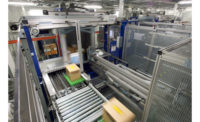Food processing innovation startup Solve For Food, Bentonville, Ark., announced that IV Ventures, LLC, Bellevue, Wash., has agreed to be the initial investor of the first Food Innovation Center.
Solve For Food's leadership team, comprised of consumer packaged goods industry veterans from Walmart, Sam's Club and Procter & Gamble, aims to raise $13 million in capital to break ground on the startups' first Food Innovation Center. The center will provide established food companies and startups with concept-to-consumption food production and innovation services using the microwave-assisted thermal sterilization (MATS) food preservation technology by 915 Labs, Centennial, Colo.
"We really believe in the Solve For Food mission and strategy to develop more nutritious packaged foods," says Brandon Ivie, president of IV Ventures, LLC. "Their approach will revolutionize the way the industry produces and the market consumes packaged foods, and we share their passion for game-changing technology. The value they will provide to the industry is core to our own mission."
The 20,000-square-foot center, to be located in Northwest Arkansas, will feature product innovation kitchens and a MATS-30 commercial scale food production system capable of producing up to 10 million packages per year. Consumer packaged goods brands and food startups will also have access to Solve For Food's concept-to-consumption strategy services, including a staff of culinary and food science experts, FDA process authorities and branding and packaging strategists to help companies develop and produce healthy, nutritious, clean label, shelf-stable packaged foods.
"We really haven't seen much in the way of innovation in shelf-stable food production and processing in 200 years," says Greg Spragg, president and CEO of Solve For Food. "By pairing our concept-to-consumption strategy services with access to MATS technology, we're lowering the barrier to entry for the CPG industry to make the leap to a better product for consumers."
"Our goal is to provide an effective disruption to old industry processing channels, leave a smaller carbon footprint and get more nutritious foods to the consumer—whether in the store, or to an urban or rural food desert," says Keith Larson, chairman of Solve For Food.


